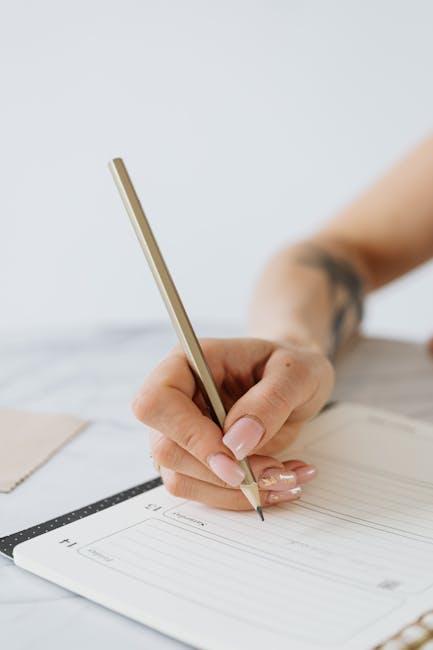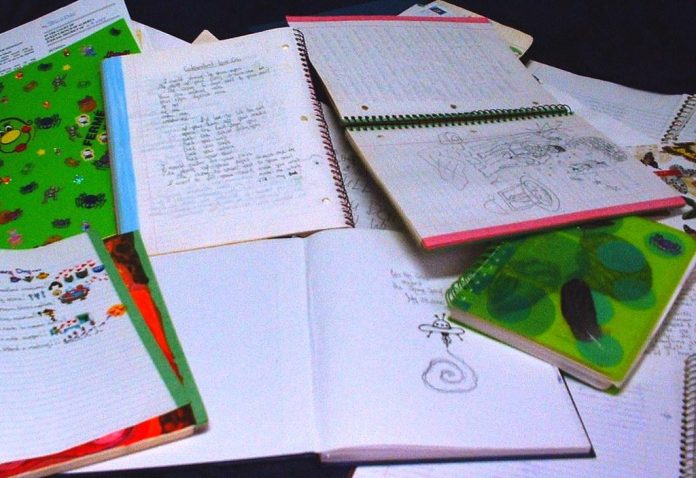In a world that spins with relentless velocity, where the cacophony of daily demands often drowns out our inner voices, finding moments of tranquility can seem like an elusive dream. Yet, nestled within the simplicity of pen and paper lies a powerful tool that has been quietly guiding minds toward clarity for centuries: journaling. This ancient practice, often dismissed as mere note-taking, harbors profound benefits for mental clarity and stress relief. As we delve into the art and science of journaling, we uncover how this humble habit can transform the way we navigate the complexities of modern life, offering a sanctuary for our thoughts and a balm for our overburdened minds.
Harnessing the Power of Self-Reflection for Mental Clarity
Engaging in self-reflection through journaling can unlock profound insights into your thoughts and emotions, serving as a powerful tool for achieving mental clarity. By dedicating a few minutes each day to write about your experiences, you can identify patterns, recognize triggers, and ultimately understand yourself better. This practice not only enhances your emotional intelligence but also paves the way for more informed decision-making and personal growth.
- Increased Self-Awareness: Regular journaling helps you become more attuned to your feelings and reactions.
- Enhanced Problem-Solving: Writing about your challenges can reveal new perspectives and solutions.
- Stress Reduction: The act of putting pen to paper can serve as a therapeutic release, alleviating built-up stress.
Daily Writing Rituals to Alleviate Stress
Incorporating a daily writing ritual into your routine can be a powerful tool for managing stress. By setting aside a few moments each day to journal, you create a dedicated space to unload your thoughts and emotions. This act of transferring your inner dialogue onto paper can lead to greater mental clarity and a sense of relief. Not only does this practice allow you to process complex emotions, but it also helps you identify patterns and triggers that contribute to your stress.
Here are some simple yet effective writing rituals to consider:
- Morning Pages: Start your day by writing three pages of free-flowing thoughts. This stream-of-consciousness exercise clears your mind and sets a positive tone for the day ahead.
- Gratitude Journaling: Dedicate a section of your journal to list things you are grateful for. Reflecting on positive aspects of your life can shift your focus away from stressors.
- Evening Reflection: Conclude your day by jotting down the day’s events, your feelings, and any unresolved thoughts. This practice can serve as a mental debrief, helping you sleep better and wake up refreshed.

Unlocking Emotional Insights Through Consistent Journaling
Consistent journaling serves as a powerful tool for diving deep into your emotional landscape. By putting pen to paper, you can unravel complex feelings, making them more manageable and less overwhelming. This practice allows you to identify patterns in your thoughts and behaviors, which can lead to profound self-awareness and personal growth. With each entry, you create a safe space to explore emotions without judgment, fostering a deeper understanding of yourself.
Some of the key benefits include:
- Enhanced Emotional Intelligence: Regular journaling helps you articulate your feelings, improving your ability to recognize and manage emotions effectively.
- Stress Reduction: By expressing your thoughts, you can alleviate mental clutter and reduce stress, leading to a calmer mind.
- Improved Problem-Solving: Writing about your challenges can offer new perspectives, enabling you to find creative solutions.
Incorporating journaling into your daily routine can unlock emotional insights that might otherwise remain hidden, offering a pathway to mental clarity and emotional balance.

Crafting a Personalized Journaling Routine for Optimal Benefits
Developing a personalized journaling routine can significantly enhance the mental clarity and stress relief benefits you gain from this practice. To start, consider the best time of day for you to journal. Some individuals find morning journaling refreshing, setting a positive tone for the day, while others prefer evening sessions to unwind and reflect.
When crafting your routine, think about incorporating elements that make the experience uniquely yours. Here are some ideas to consider:
- Choose a dedicated space: Find a quiet, comfortable spot where you can write without interruptions.
- Set a regular schedule: Consistency is key. Aim to journal at the same time each day, even if it’s just for a few minutes.
- Use prompts: If you’re unsure what to write, prompts can help spark creativity and guide your thoughts.
- Include mindfulness techniques: Start or end your journaling session with a few minutes of meditation or deep breathing to center yourself.
- Personalize your tools: Select a journal and writing instruments that you love. This can make the process more enjoyable and encourage you to stick with it.
By tailoring your journaling routine to fit your lifestyle and preferences, you can maximize the therapeutic benefits and make it a rewarding part of your daily life.





